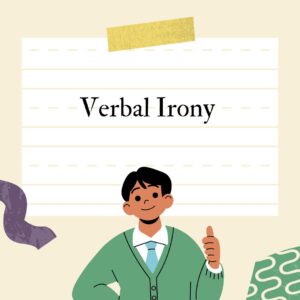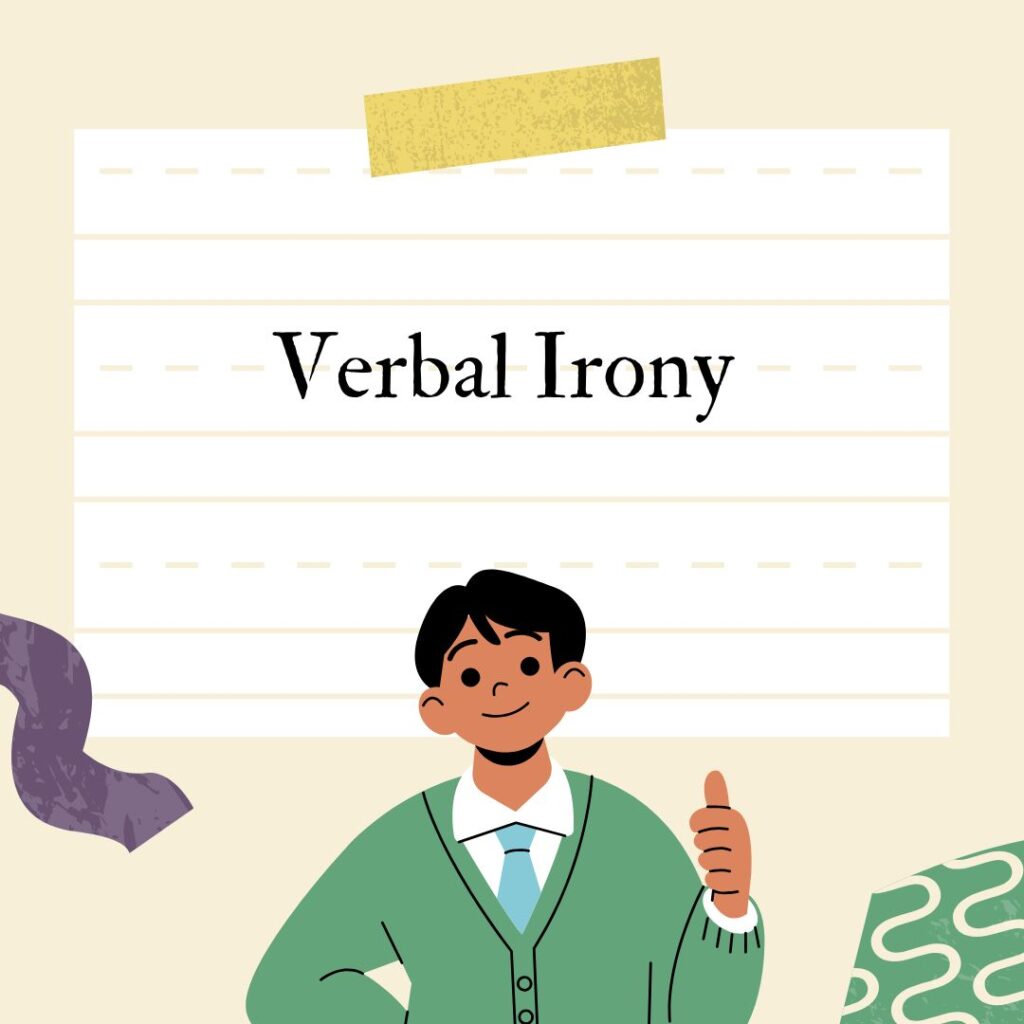Verbal Irony – Definition, Usage, and Examples
Verbal irony is a powerful rhetorical device that adds depth, humor, and complexity to both spoken and written language. It occurs when a speaker says one thing but means another, often conveying a meaning that is contrary to the literal interpretation of their words. This guide will delve into the intricacies of verbal irony, its significance in literature and everyday conversation, examples across various contexts, and tips for effectively incorporating it into your writing.

Table of Contents
What is Verbal Irony?
Verbal irony is a figure of speech in which the speaker’s intended meaning is different from the literal meaning of their words. It is often used to convey sarcasm, humor, or an underlying truth that contrasts with what is being said.
Definition
In essence, verbal irony involves a deliberate contradiction between what is said and what is meant. This can manifest in various forms, including sarcasm, understatement, overstatement, and Socratic irony.
The Importance of Verbal Irony
Verbal irony plays a significant role in communication for several reasons:
- Enhances Humor: It adds a layer of wit to conversations and narratives, making them more engaging and entertaining.
- Emphasizes Contradictions: By highlighting discrepancies between appearance and reality, verbal irony can expose contradictions in characters or situations.
- Encourages Critical Thinking: It prompts audiences to think critically about the underlying meanings behind statements.
- Develops Characterization: In literature, characters who use verbal irony can be portrayed as clever or sarcastic, adding depth to their personalities.
How Verbal Irony Differs from Other Types of Irony
While verbal irony is one of the three main types of irony (the others being situational irony and dramatic irony), it has distinct characteristics:
- Situational Irony: This occurs when there is a difference between what is expected to happen and what actually happens (e.g., a fire station burning down).
- Dramatic Irony: In this case, the audience knows something that the characters do not (e.g., in a horror movie where the audience knows the killer is hiding).
Verbal irony specifically focuses on the contrast between spoken words and their intended meanings.
Examples of Verbal Irony
To illustrate verbal irony effectively, let’s explore various examples across different contexts.
Literary Examples
- Julius Caesar by William Shakespeare:
- Mark Antony’s famous line “But Brutus says he was ambitious; / And Brutus is an honorable man” serves as verbal irony because he uses praise to imply criticism.
- Pride and Prejudice by Jane Austen:
- Mr. Bennet often employs verbal irony when he speaks about his family’s antics in a sarcastic tone that reveals his true feelings about their behavior.
- The Gift of the Magi by O. Henry:
- The story’s conclusion highlights verbal irony as both protagonists sacrifice their most prized possessions for each other’s gifts, rendering them useless yet demonstrating their love.
Film and Television Examples
- Shrek:
- When Donkey asks Shrek if he can stay with him, Shrek replies sarcastically, “Of course,” which reveals his true desire for solitude.
- The Office:
- Michael Scott frequently uses verbal irony; for instance, when he claims “I am running away from my responsibilities,” it highlights his avoidance of adult life.
- Dr. Strangelove:
- The line “Gentlemen! You can’t fight in here! This is the war room!” exemplifies verbal irony by contrasting the serious context with the absurdity of fighting in a place dedicated to war strategy.
Real-Life Examples
- Weather Commentary:
- Saying “What a beautiful day!” during a torrential downpour showcases verbal irony as it contradicts the reality of the situation.
- Everyday Conversations:
- After experiencing a series of unfortunate events, someone might exclaim, “Just my luck!” indicating that their luck has been anything but good.
- Social Media Posts:
- A person might post on social media about their terrible experience at an event while captioning it with “Had the time of my life!”—a clear instance of verbal irony.
How to Use Verbal Irony in Your Writing
Incorporating verbal irony into your writing can enhance your narrative and engage readers more effectively:
- Establish Context: Set up situations where expectations are clear so that the contrast becomes meaningful when you introduce verbal irony.
- Use Character Voice: Ensure that your characters’ use of verbal irony aligns with their personalities; this adds authenticity to their dialogue.
- Balance Tone: Use verbal irony judiciously; too much can overwhelm readers or dilute its impact, while too little may fail to convey intended humor or emphasis.
- Foreshadowing: Subtly hint at ironic outcomes through dialogue or narrative descriptions without revealing too much upfront.
Common Mistakes to Avoid
When using verbal irony in your writing, be mindful of these common pitfalls:
- Overusing Sarcasm: While sarcasm is a form of verbal irony, relying too heavily on it can make characters seem bitter or unlikable if not balanced with genuine emotion.
- Lack of Clarity: Ensure that readers understand the intended meaning behind ironic statements; otherwise, they may misinterpret your message.
- Ignoring Context: Failing to establish context can lead to confusion; always provide enough background for readers to grasp the ironic nature of statements.
- Neglecting Emotional Resonance: Ensure that your use of verbal irony contributes meaningfully to character development or thematic elements rather than serving as mere embellishment.
FAQs
1. What is verbal irony?
Verbal irony is a rhetorical device in which a speaker says one thing but means another, often conveying a meaning that is contrary to the literal interpretation of their words. It is commonly used to express sarcasm or humor.
2. How does verbal irony differ from other types of irony?
Verbal irony differs from:
- Situational Irony: Where the outcome is contrary to what was expected (e.g., a fire station burning down).
- Dramatic Irony: Where the audience knows something that the characters do not (e.g., in a horror movie where the audience knows the killer is hiding).
3. Can you provide examples of verbal irony?
Certainly! Some examples include:
- Saying “Oh, fantastic!” when something goes wrong.
- A character in a story saying, “What a pleasant surprise!” when they receive bad news.
- A person commenting on a rainy day by saying, “What lovely weather we’re having!”
4. Why is verbal irony important in literature and communication?
Verbal irony adds depth and humor to writing and speech, engages audiences, emphasizes contradictions, and can reveal character traits or societal critiques. It encourages readers and listeners to think critically about underlying meanings.
5. How can I effectively use verbal irony in my writing?
To use verbal irony effectively:
- Establish clear expectations for your audience.
- Create contrasts between what is said and what is meant.
- Use it sparingly to maintain its impact and avoid confusion.
6. What are some common mistakes to avoid when using verbal irony?
Common mistakes include:
- Overusing sarcasm, which can make characters seem unlikable.
- Failing to provide context, leading to misunderstandings.
- Ignoring the emotional resonance of ironic statements.
7. Is verbal irony always humorous?
Not necessarily. While verbal irony often has humorous undertones, it can also convey serious or critical meanings depending on the context. The emotional impact varies based on how it’s used.
8. Can verbal irony occur in everyday conversations?
Yes, verbal irony is commonly found in everyday speech. People often use it to express frustration, sarcasm, or humor in social interactions.
9. How can I identify verbal irony in a text?
Look for statements where the literal meaning contrasts with the context or situation. If a character says something that seems contradictory or exaggerated compared to what’s happening, it may be an example of verbal irony.
10. Does verbal irony have cultural variations?
Yes, the understanding and use of verbal irony can vary across cultures. What may be considered humorous or acceptable in one culture might not translate well into another due to different social norms and communication styles.
Conclusion
Verbal irony is an essential literary device that enriches storytelling by introducing unexpected twists in meaning through contrast between spoken words and intended messages. By understanding its definition, importance, types, examples, and effective usage techniques, writers can craft engaging narratives that resonate with readers on multiple levels.As you continue your writing journey in 2025 and beyond, consider how incorporating verbal irony can enhance your work—whether through humor, critique, or profound insights into human nature! Happy writing!
Discover marketing services, interviews & publishing tools at SharingStories.


